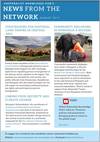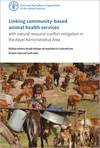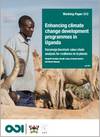Newsletter containing updates of activities, events and experiences from among pastoral civil society organizations.
Year of publication: 2017Organization: 联合国粮食及农业组织
Topic: 气候变化, 性别和青年问题, 土著知识, 土著人民, 土地, 组织, 参与
Language: English
Type of document: 时事通讯
Geographical coverage: 全球
Several interlinked triggers such as climate change, environmental degradation, lack of resources, and so on, cause large-scale displacement of populations in the Horn of Africa. This may, in turn, trigger conflicts and violence and increase the communities' vulnerability to natural hazards. There is a great need to address the risk and impacts of displacement caused by disasters and exacerbated by climate change. But to be able to do this, governments need baseline data regarding current displacement.
This report provides such a baseline for the Greater Horn of Africa - Djibouti, Eritrea, Ethiopia, Kenya, Somalia, South Sudan, Sudan and Uganda, plus Burundi, Rwanda and Tanzania - with the ultimate aim of reducing future displacement risk. These countries also have a large pastoralist population. The report gives an overview of the scale, scope and distribution of risk associated with suddenonset natural hazards, and explains the methodology used to calculate it.
Organization:
Topic: 气候变化, 冲突, 食品安全, 土地, 复原力
Language: English
Type of document: 技术
Geographical coverage: 东部非洲
Newsletter containing updates of activities, events and experiences from among pastoral civil society organizations.
Year of publication: 2017Organization: 联合国粮食及农业组织
Topic: 气候变化, 性别和青年问题, 土著知识, 土著人民, 创新, 土地, 组织, 参与
Language: English
Type of document: 时事通讯
Geographical coverage: 全球
The Abyei Administrative Area is a contested zone located on the border between South Sudan and Sudan whose status remains unresolved since the separation of the countries. It is a grazing hub in which both the Dinka Ngok (affiliated with South Sudan) and the Missiriya (affiliated with Sudan) tribal communities interact, sharing natural resources such as grazing land, pastureland and water. However over the past decades, access to natural resources has become increasingly contested, causing ethnic tensions and undermining livelihoods and cooperation between the groups. This report highlights the role that FAO has played in initiating and facilitating a process focused on dialogue and building social cohesion at grassroots level, contributing to wider sustainable peace initiatives. It has done this through the technical delivery of community-based animal health veterinary services in an effort to improve inter–community relations to sustaining peace.
Year of publication: 2017Organization: 联合国粮食及农业组织
Topic: 冲突, 复原力
Language: English
Type of document: 技术
Geographical coverage: 东部非洲
Progressive control pathways (PCPs) are stepwise approaches for the reduction, elimination, and eradication of human and animal diseases. This article outlines a PCP for tsetse - transmitted animal trypanosomiasis, the scourge of poor livestock keepers in tropical Africa.
Initial PCP stages focus on the establishment of national coordination structures, engagement of stakeholders, development of technical capacities, data collection and management, and pilot field interventions. The intermediate stage aims at a sustainable and economically profitable reduction of disease burden, while higher stages target elimination. The mixed - record of success and failure in past efforts against African animal trypanosomiasis (AAT) makes the development of this PCP a high priority.
Year of publication: 2017
Organization: 联合国粮食及农业组织, 个人作者
Topic: 医疗服务
Language: English
Type of document: 技术
Geographical coverage: 全球
Climate change will have significant impacts on economic activity and value chains in Uganda. But it can also provide new possibilities for people and businesses – for example, to create new products and services, develop new markets and access new funding streams and finance mechanisms.
The semi-arid Karamoja region in the northeast of Uganda accounts for around 20% of Uganda’s total livestock. This paper identifies and explores the economic opportunities for entrepreneurs and companies to invest in climate change adaptation to enhance the resilience of Karamoja’s livestock value chain. Investment in this sector can reduce the vulnerability of pastoralists to climate change and contribute to national development goals.
Year of publication: 2017Organization:
Topic: 气候变化, 经济, 创新, 组织, 复原力, 增加价值
Language: English
Type of document: 技术
Geographical coverage: 东部非洲
This film highlights economic opportunities for investment in the development of the livestock sector in the Karamoja region of Uganda that are both inclusive and climate-resilient. It contributes to a paradigm shift perceptions of pastoralism, moving away from seeing it characterised by poverty, drought and famine to a livelihood characterized by opportunity, trade and resilience.
Year of publication: 2017Organization: ,
Topic: 气候变化, 复原力, 增加价值
Language: English
Type of document: 视频
Geographical coverage: 东部非洲
This is a summary of a study, commissioned by the Alliance for Food Sovereignty in Africa (AFSA) on pastoralism-related policy in the Horn of Africa and East Africa. The aim of the desk review study was to identify and analyse policy and regulatory frameworks in the Intergovernmental Authority on Development (IGAD) and East African Community (EAC) regions, and their implications for the practice of pastoralism, and food sovereignty, so as to inform civil society and pastoralist groups’ advocacy. Several conclusions were drawn based on the review and analysis which were then used to inform the recommendations that were made.
Year of publication: 2017Organization:
Topic: 食品安全
Language: English
Type of document: 技术
Geographical coverage: 东部非洲









